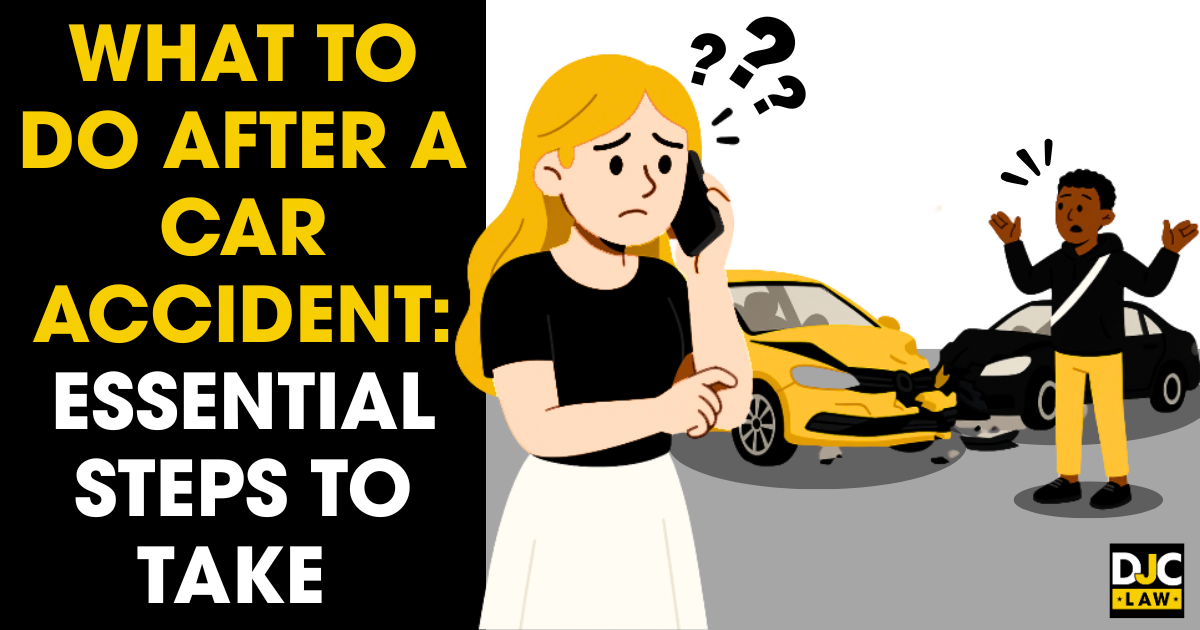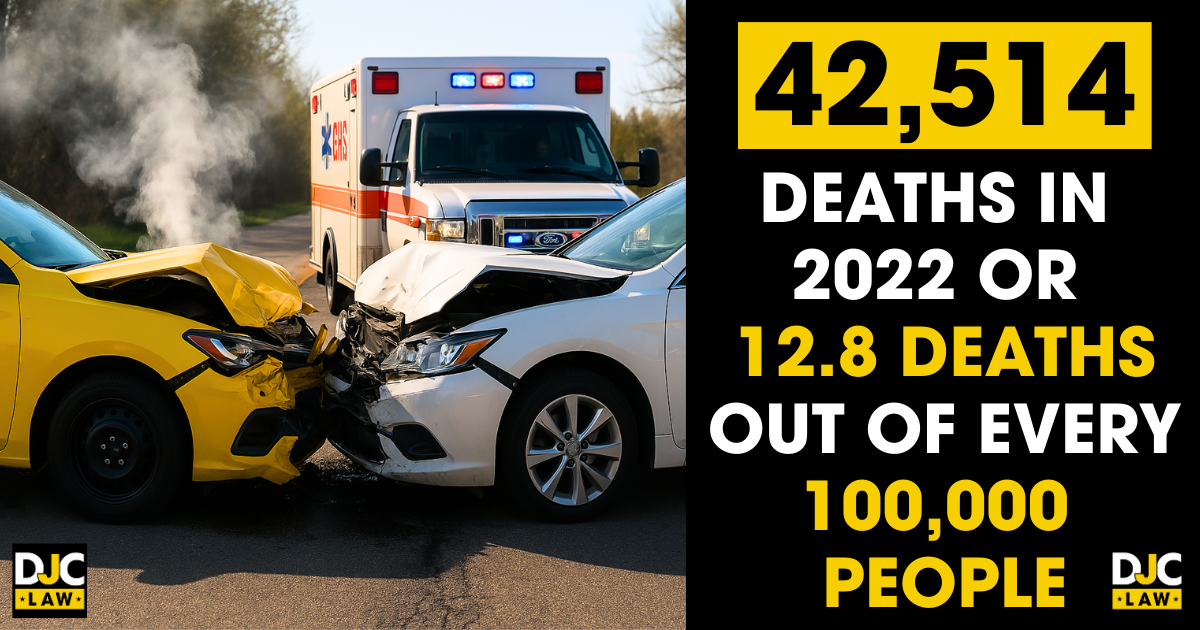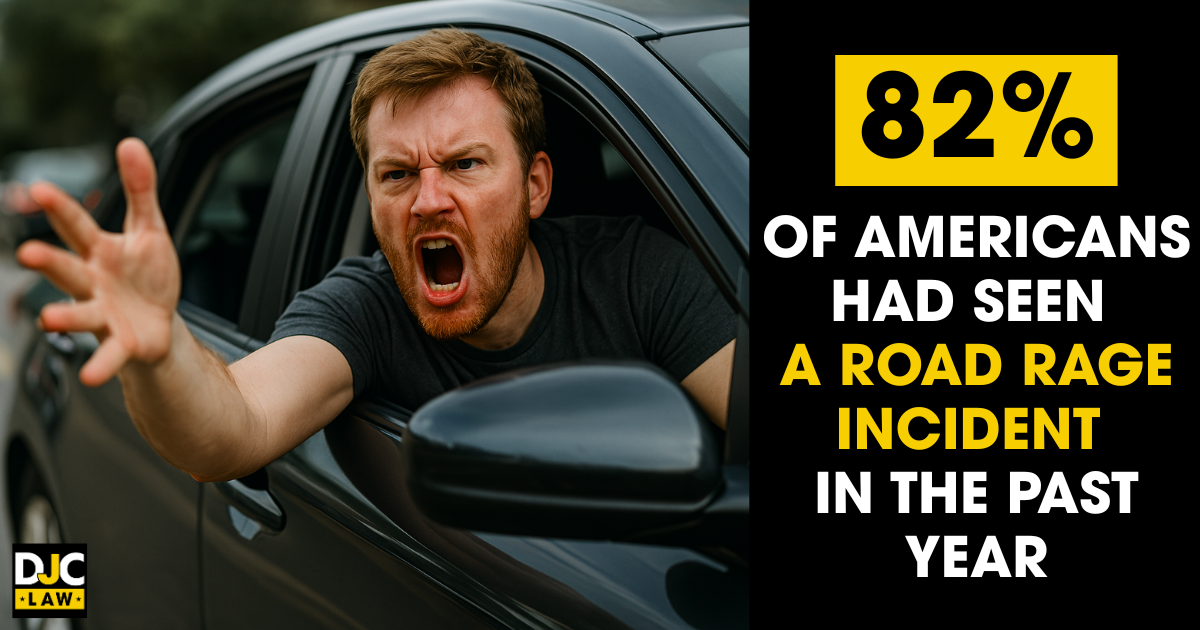
Nobody wants to think about the prospect of being hit and injured by an irresponsible driver. Sadly, it’s a reality that afflicts millions of Americans each year, with MarketWatch reporting as many as 5.9 million accidents in 2022.
Thankfully, the vast majority of car accidents are just a bad day, but IIHS numbers still reported 42,514 deaths in 2022 or 12.8 deaths out of every 100,000 people. It might never happen, but knowing what to do if you’re part of a car accident is critical for keeping yourself safe and claiming your losses.
If you’ve been hurt in a crash, speaking with an experienced Austin car accident lawyer can help ensure your rights are protected and you receive the compensation you deserve.
In today’s step-by-step guide, we’ll provide a comprehensive list of what you should do if you’re struck by a negligent driver.

Key Takeaways
- After a car accident, assess your injuries, ensure your own safety, call the police, and exchange contact and insurance details with the driver.
- If you can and it’s safe, use your smartphone to take photos of the accident scene, focusing on damage, injuries, and the area around you.
- Speak to eyewitnesses and collect statements. Take their contact details so your lawyer can contact them later.
- Seek immediate medical attention, even if you feel okay. Many injuries take hours, days, and weeks to begin showing symptoms, and not receiving prompt treatment could put your life at risk.
- Keep as many details as possible regarding your accident, including examination results, invoices, and a diary to document your emotional well-being in the days after your car crash.
- Avoid making common accident mistakes that could see your car insurance claim devalued or denied, such as admitting fault to the other driver, not seeking medical attention, and failing to gather evidence.
- Hiring a lawyer to handle your claim is imperative if you’re dealing with serious injuries, disputed liability, and multiple liable parties. Legal representation is also crucial if your claim has been denied.
Immediate Actions to Take Following a Car Accident
Most people’s first reaction to a car accident is a mix of anger and shock. Stay calm and prioritize your safety at the scene before doing anything else. Once you’ve taken an inventory, you can call 911, gather evidence, and exchange details with the other driver.
Unfortunately, your actions at this stage will either help a future claim for damages or harm it. That’s the number one reason all drivers should familiarize themselves with what to do after an accident.
Stay Calm and Assess Any Injuries
Don’t get out of your car and act aggressively. It could put you in danger and land you in legal trouble. Whatever you do, don’t escalate the situation. The Zebra reported that 82% of Americans had seen a road rage incident in the past year, and many have ended with tragic consequences.

Take a few deep breaths and assess yourself and other passengers for any injuries. If anyone reports serious injuries, call for an ambulance to attend the scene. Your immediate priority is your health and safety.
Ensure Safety at the Scene
Assuming you can walk away, your next step is to ensure your safety at the scene. In other words, get away from the road. If possible, pull your car over to the side of the road and leave your hazard lights on to warn other road users.
Don’t stay sitting in your car just in case someone doesn’t spot you in time and crashes into the back of your vehicle. If there’s a safety barrier, get on the other side of it.
Contact Emergency Services and File a Police Report
Call 911 and ask for a police officer to arrive at the scene. The purpose of a traffic officer is to calm the situation down, deal with oncoming traffic, and fill out an official police accident report. The officer’s interpretation of the accident is vital evidence you can use as part of your insurance claim.
Note that if an officer doesn’t attend, you can file your own report with the Texas Department of Transportation. It can be done online and is known as a CR2 report.
Gather and Exchange Information With Involved Parties
Texas law mandates that all drivers must exchange their contact and insurance details, including information like vehicle registration and driver’s license number. Driving off before the police arrive or refusing to give these details is illegal, and you could be charged with a misdemeanor, which may result in fines, license suspension, or even incarceration.
You’re not required to provide anything else or engage in further discussions. Avoid saying too much, or this could work against you later. If the other driver isn’t forthcoming, ask the police to attend and report the driver’s license plate.
Document the Incident Thoroughly
Gather as much evidence from the scene while it’s fresh. The Pew Research Center reports that 91% of Americans have a smartphone, so use yours to take pictures of the scene of the accident. Here’s what to concentrate on:
- Visible injuries
- Positions of each vehicle
- Road conditions
- Road signage
- Vehicle damage
- Property damage
It doesn’t have to be a Picasso. Amateur shots are more than sufficient. You’ll also want to talk to any eyewitnesses. Ask for their contact details so that they can be contacted later. Note that eyewitnesses aren’t obligated to cooperate, so if they don’t want to get involved, you must accept that.
Limit Discussions With the Other Driver
The biggest mistake accident victims make is getting into a debate or in-depth discussion with the other driver. Remember, Texas is an at-fault state, and they’ll also be making a car accident claim. The driver who’s at fault will be required to pay up, so the last thing you want is to give them the ammunition they can use later.
Anything you say can and will be used against you to refute valid insurance claims and make it more complex to succeed with personal injury lawsuits. Don’t speculate, admit fault, or apologize.
Be cordial and polite, but only disclose what you legally have to.
What to Do After a Minor Accident or Fender Bender
Minor accidents work a little differently from major ones because the police may not respond. According to Texas law, you’re only required to report an accident to the police if there’s at least $1,000 of property damage or injuries/fatalities. Most scuffs and scratches won’t meet this threshold, and police may decline to attend.

Nevertheless, the steps don’t change. Gather evidence, exchange insurance and vehicle details, and seek medical attention for a quick checkup. The only difference is you’ll have to fill out your own CR2 form instead.
But there are other considerations.
When to Move Vehicles and When to Stay Put
Generally, it’s advised that you move your vehicle out of harm’s way whenever possible and whenever it’s safe to do so. Moving your vehicle off to the shoulder is safer for everybody and ensures that another driver hitting a stationary vehicle won’t make the accident worse.
So, when should you move your vehicle?
- If it’s operable.
- If there are no injuries/fatalities.
- If you’re on a busy road where staying put would be a hazard to other vehicles.
Vehicles that cannot be moved should be left where they are with their hazard lights running. Move away from your car, get off the road yourself (preferably behind a safety barrier), and report to the police immediately that your vehicle is blocking the road so they can take charge of the situation.
Identifying Damage: Minor vs. Major Accidents
Understanding what constitutes a minor vs. major motor vehicle accident will allow you to react accordingly. Typically, accident severity is determined by injuries to the driver/passengers and vehicular damage.
A minor accident is usually a low-speed impact where the airbags didn’t deploy. The damage is usually cosmetic, with scratches, dents, and cracks. In contrast, a major accident will involve injuries, damage to the vehicle’s ability to operate, and structural damage.
Understanding the Insurance Claim Process for Minor Accidents
The insurance claim process for minor accidents follows the same process as claiming for a major accident. However, minor accidents are usually quicker to claim since insurance adjusters will usually not fight hard over a $200 repair bill.
Follow these steps:
- Report your accident to your insurer.
- Submit relevant evidence to support your claim.
- Get a damage inspection (your insurer may require you to visit a specific repair shop).
- Wait for fault to be determined.
- Receive your settlement and go through the vehicle repair process, or receive the actual cash value if the vehicle involved is totaled.
Of course, if the insurer determines that the fault lies with you, you’ve got the option of appealing or filing a personal injury lawsuit.
Note that if you have collision coverage, your repair costs will be covered by your own insurance company regardless of who’s at fault.
Key Steps in the Days Following an Accident
The days after your accident will be about processing your trauma, dealing with healthcare providers/insurers, and initiating your claim against the at-fault driver. This is where many victims don’t know what to do.
The answer is to seek medical care, gather and organize your records, notify your insurer, and work with an experienced car accident attorney to pursue your claim.
Seek Medical Attention, Even If You Feel Fine
People often feel fine in the immediate aftermath of accidents, but that doesn’t mean they aren’t injured. Approximately 5.2 million medically consulted injuries were reported in 2022, per the National Safety Council.

Highly visible injuries will be obvious, but your body’s adrenaline represses many internal injuries. That’s why whiplash, internal bleeding, organ ruptures, and other injuries may take hours, days, or weeks to start showing symptoms.
Alongside preserving your health, seeking medical attention preserves your claim. It’s difficult to argue a high degree of seriousness for your injuries when you decide against seeking help, after all.
Keep Detailed Records of All Expenses and Communications
Maintain all records and communications, including invoices, prescriptions, examination results, and emails. Paperwork keeps a complete record of how much your claim is worth in dollar terms and provides a clear paper trail that can be used to tell the story of your losses later.
We also recommend keeping a diary of your experiences after your accident. Talk about any physical ailments, what you did, and your emotional and mental well-being. Although it might seem silly, these diaries provide insights into the impact the other driver’s actions had on your life.
Consultation With Legal Professionals: When and Why
Contacting a legal professional ensures that your legal rights are protected, and someone else takes the strain of dealing with insurance adjusters and filing all claims-related paperwork. It’s an opportunity to attain peace of mind while you focus on recovering from your injuries.
When should you call an attorney?
The answer is as soon as possible. Involving a personal injury lawyer as early as possible in the process preserves the integrity of your claim and stops bad-faith tactics from the at-fault driver’s insurance provider before they begin.
Of course, a claim must be worthwhile. There’s little purpose in contacting a car accident lawyer over a $100 scratch to a rental car that can be buffed out. Generally, the more valuable the claim, the greater the value of hiring a lawyer.
Don’t know whether your claim is worth it? Seek legal advice from a firm like DJC Law for a free case consultation.
Notify Your Insurance Company Promptly
It’s standard practice for auto insurers to require that all accidents be reported as part of the terms and conditions of your policy. Even if the accident is minor, not doing that could invalidate your coverage and result in an automatic denial of your claim.
Your insurer’s terms and conditions will tell you how long you have to report an accident. Typically, you’ll have 24-72 hours to report it.
Filing a Personal Injury Claim: Your Rights Explained
All injured parties involved have the legal right to file a personal injury claim against the at-fault driver’s insurance company. It’s the principle that parties who have suffered losses due to the negligence of others have the right to be made whole again.
Most claims are settled by claiming against the driver’s insurance in an at-fault state like Texas. However, if your claim is denied or you receive a poor offer, you can file a personal injury lawsuit in court. This also applies if the driver has no insurance or insufficient coverage. In these cases, you can file a lawsuit against the driver personally.
Navigating Insurance Claims After an Accident
After any accident, it’s vital to report your accident and initiate your insurance claim as soon as possible. In Texas, fault determines liability, so launch the process by notifying your insurer and providing as much detail as possible.
Take too long to report or don’t report at all, and you risk losing out on your opportunity to claim at all. So, how do you navigate your insurance claim?
Understanding Your Coverage and Policy Details
Your coverage type will determine what you’re entitled to and the maximum amount you can claim. In Texas, there’s a variety of coverage options available. Here’s a breakdown of different insurance policies and add-ons:
- Liability Coverage – Liability coverage is the minimum insurance required by drivers in Texas. However, this only covers damages and injuries you cause to someone else.
- Collision Coverage – Collision coverage will pay for vehicular damage no matter who’s at fault.
- Comprehensive Coverage – Comprehensive coverage covers any damages unrelated to collisions, including theft, vandalism, and fire.
- Uninsured/Underinsured Motorist Coverage – This type of coverage will cover you if the at-fault driver has no insurance or insufficient insurance to cover your damages.
- Personal Injury Protection (PIP) Coverage – PIP coverage will cover all medical expenses regardless of who’s at fault.
The Claims Process: What to Expect
All auto insurers may operate differently, but the fundamental claims process remains the same no matter who you’re with. Here’s what it looks like:
- File your initial claim.
- An insurance adjuster will investigate the accident.
- Your vehicle will be inspected.
- Fault will be determined and a settlement offer made.
- Choose whether to accept the settlement or file a lawsuit.
- Receive your settlement.
What to Do If Your Claim is Denied
Insurers can and do deny claims. That doesn’t mean you have no recourse. All insurers have an appeals process. Ask for an official claim denial letter outlining why your claim was denied. Gather and submit any further evidence to support your claim.
It’s best to hire a lawyer to deal with this to increase your chances of getting your claim approved. If you feel the insurer has acted in bad faith, file a report with the Texas Department of Insurance (TDI).
Uninsured or Underinsured Drivers: Handling the Scenarios
In an at-fault state like Texas, you claim for damages through the other person’s insurance. If they don’t have insurance or don’t have enough insurance, you have a problem.
The first port of call is to consult your uninsured/underinsured motorist coverage. If you have it, you can claim for your losses through your own insurer using this coverage. If not, consider collision or PIP coverage to cover some of your losses.
Your final option is to file a lawsuit against the other driver. According to the Insurance Information Institute, one in seven drivers is uninsured. Filing a lawsuit can allow you to claim compensation, but actually collecting on a judgment may prove impossible if they don’t have any personal assets.
Common Mistakes to Avoid After an Accident
The wrong move after an accident could derail your claim. What you say and do can be used as evidence to minimize your injuries or place partial blame on you, which will reduce your overall compensation amount under Texas’ shared fault laws.
So, what are the biggest mistakes accident victims make?
Being Overly Conversational With the Other Driver
Naturally, you want to be polite, but be careful with what you say. Anything can be used against you because the other driver will also be making a claim and trying to shift the blame to you.
Never admit fault, even if you are at fault. Even a casual apology implies some level of fault on your behalf. Just give them the necessary information and nothing more.
Failing to Document Sufficient Evidence
Evidence is the only differentiator between your word and theirs. The accident scene is the best opportunity to gather evidence.
Use your phone to take photos and talk to any eyewitnesses. Record all details and obtain a copy of your policy report. Working with an attorney can also result in other types of evidence, including traffic camera footage and accident reconstructions.
Not Reporting the Accident to Insurers
Never try to handle an accident “privately,” even if it’s minor. Not reporting an accident will break the terms and conditions of your insurance policy. This could result in your claim being denied, even if the other driver was at fault.
Ignoring Medical Check-Ups for Potential Injuries
Always go directly from the accident scene to a medical facility. Many injuries aren’t immediately apparent, including concussions. Medical professionals can diagnose hidden injuries and treat them before they become serious. Some injuries, like internal bleeding, could also cost you your life.
Plus, if you don’t seek medical attention, it’s evidence that insurance adjusters can use to devalue your claim or deny it entirely.
Legal Considerations After a Car Accident
All car accidents come with legal implications. Understanding your rights is crucial for ensuring you’re not left out of pocket because of the actions or inactions of a negligent driver.
Typically, there are three points to remember, if nothing else:
- Statute of Limitations – You have two years from the date of your accident to file a lawsuit for damages. If you miss out on this deadline, you lose the right to claim any compensation.
- Comparative Fault – Texas is an at-fault state operating on comparative fault rules. In other words, fault may be shared, and your compensation will be reduced by the proportion of the blame you assume.
- 51% Bar Rule – Under Texas law, you’re banned from receiving any financial compensation if you’re 51% or more responsible for an accident.
When to Hire a Lawyer: Signs You Shouldn’t Handle It Alone
Minor accidents may be resolved via a standard insurance claim without the need to bring in legal representation. For more serious accidents and high-value cases, hiring a lawyer shouldn’t be considered optional but essential.
Here’s when you should hire an experienced personal injury lawyer:
- Serious injuries
- Disputed liability
- Long-term medical treatment
- Claim denial
- Multiple parties
- Uninsured/underinsured drivers
If any of these circumstances apply to your traffic accident, your case will take a whole new level of complexity. Not hiring a lawyer will jeopardize your claim from the beginning.
Potential Compensation for Damages: What You Need to Know
Economic and non-economic damages are among the losses you can claim via the other driver’s insurer or a personal injury lawsuit. Attorneys are experts in uncovering the different types of damages that an amateur would otherwise miss.
Here are some examples of what you can claim:
- Medical bills
- Lost wages
- Future lost income
- Pain and suffering
- Property damage
- Loss of consortium
- Punitive damages
- Loss of quality of life
Which ones apply to your case? The easiest way to find out is to contact an attorney for more information via a free personal injury case consultation.
Final Thoughts: Preparing for the Aftermath of a Car Accident
It’s perfectly normal to feel overwhelmed by the aftermath of an auto accident, especially if you’ve suffered severe injuries at the hands of another driver. Trying to handle it yourself isn’t the way forward.
Instead, seek legal help from a professional who knows precisely how to manage your claim and assert your legal right to compensation. At DJC Law, our auto accident law firm has won more than $400 million for hard-working Americans across the Lone Star State.
If you’re ready to see how much you’re entitled to, contact us for your free consultation now.
Frequently Asked Questions About Car Accidents
What to do if the other driver leaves the scene?
Call the police authorities immediately. Regardless of the circumstances, leaving after an accident happened is a criminal offense. Try to provide the officer with as many details as possible, including make, model, and license plate numbers. Don’t attempt to put yourself in harm’s way by trying to stop the driver from leaving.
How will a car accident impact my insurance rates?
Car accidents usually increase your auto insurance premiums. However, these rises are often temporary if you weren’t at fault. Further accidents will stay on your record and continue to impact your premiums for a few years.
Do I need a lawyer for a minor accident?
It depends. Straightforward claims involving a few hundred dollars for a damaged vehicle likely don’t need a legal professional to intervene. However, high-value cases with complexities like multiple other parties and disputed legal liability will benefit from the touch of a well-trained legal professional.



